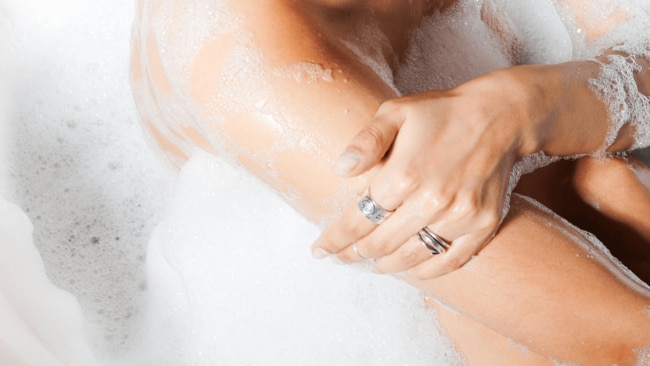Could psychodermatology be the cure for your skin concerns?
We’ll give anything a go once
Lifestyle
Don't miss out on the headlines from Lifestyle. Followed categories will be added to My News.
Why is it that whenever you have a big important event coming up, your skin decides to freak out? Whether it’s party pimples, a flare-up of eczema or a rosy flush of rosacea—the state of our skin can impact our mental wellbeing more than we think.
While the explosion of the wellbeing movement in recent years has drawn our attention to the power of the gut-skin axis – and how our skin can provide deep insight into the state of our inner health more broadly – understanding the close relationship between our brain and our skin, still feels like a fairly fresh concept. But the good news is, an exciting new field is emerging that explores how our mental well-being can impact our skin – and vice versa.
Known as psychodermatology – and despite being still relatively unknown here in Australia, this cutting-edge field is gaining in popularity overseas and could be the missing link when it comes to curing some of the most common skin concerns.
“Psychodermatology is the part of dermatology that considers both the mind and the skin together when seeing a person with a skin problem,” explains Consultant Dermatologist, Dr Alia Ahmed from The Psychodermatologist. “As a dermatologist, I know that my patients are at higher risk of developing poor psychological health and these feelings can then impact their skin—turning into a vicious cycle.”
“In psychodermatology, I use a holistic approach to treat the skin condition and the psychological impact, as well as decoding how lifestyle factors are affecting their skin problem,” explains Dr Ahmed.
“Very few people realise how reactive their skin is to lifestyle choices but many of the patients I see either have a chronic skin disease that then has a psychological impact and/or is impacted by stress – for example, low self-esteem or body confidence, anxiety and depression. Or, psychiatric problems presenting to dermatology – for example, body dysmorphia, hair pulling or skin picking.”
What’s important to note too, is that you don’t have to be experiencing more serious or chronic skin issues for your mental well-being to be impacted. “There is evidence to say that the severity and site of the condition does not dictate the psychological impact,” says Dr Ahmed.
And many of us also likely remain unaware of just how much our skin is contributing to our state of mind until we are asked directly about it. “When assessing my patients, I’m always looking for any clues to underlying psychological distress,” says Dr Ahmed.
“I ask specifically how people’s skin is affecting their life and importantly, if it is stopping them from doing what they want to do. I’ll ask about mood, lifestyle (sleep, exercise, diet, fluid intake etc), relationships, work/study and stress. And what I find is usually people aren’t expecting these questions, but they are quick to see the link between how they are feeling and their skin/hair/nail issue once they realise how they are linked.”

As a patient, it is also undoubtedly refreshing when their healthcare practitioner takes a more holistic approach. Dr Ahmed agrees, “It is much easier to engage the patient if they feel they’re being listened to. I also find that psychodermatology makes you more approachable so patients become more open in these conversations and are really able to confide their issues and struggles. In psychodermatology, we recognise the link and treat not only the skin condition but also the psychological impact it is having.”
What’s important to recognise is that any skin condition can contribute to poor mental health but Dr Ahmed says some of the more common concerns include eczema, acne, psoriasis, rosacea, urticaria, alopecia areata and vitiligo. “I normally suggest people keep a diary of their symptoms and what was going on at the time. In fact, one of the most common questions I ask is: have you been experiencing any unusual stress? Most conditions are chronic and therefore people have usually spent some time picking up on possible triggers and trends in symptoms.”
Once you have that data in hand, there’s no question a multi-pronged approach using psychodermatology could be the key to curing your skin concerns – and with increasing focus on more holistic modalities of treatment, patients are seeing better results. “Adjunctive therapies include relaxation therapies, mindfulness and other cognitive-behavioural therapies,” explains Dr Ahmed.
“In some cases, where psychological distress is severe, I will treat this with mood or anxiety-managing medications. For example, someone with acne may be feeling anxious about being in a social environment because of their skin, so in addition to treating their acne, I will discuss techniques they can use to overcome these feelings and empower them to do the things they want. I also assess the person as a whole, we talk at length about their lifestyle, skincare regimes, work/study environment and relationships.”

Applying the principles of psychodermatology
So, how can we apply some of the principles of psychodermatology to our lives more broadly? Well, the key is to think about your skin issue deep below the dermis – and look beyond your ‘shelfie’ of cute skincare products for the solution to your skin woes. Dr Ahmed suggests thinking of your lifestyle practices as part of your skincare routine. Some of her top tips include:
#1. Manage your environment: create a feeling of positivity around you using scents, music and textures. Spend time de-cluttering your surroundings and optimising them for their intended activity. Research shows that a stressful environment (eg. noise, lack of comfort) can affect mental health and wellness.
#2. Consider what makes you happy: try to incorporate a positive activity into the beginning of your day (as you’re more likely to do it!) or build it into your timetable so you can look forward to it. Positive activities make you more alert, restore balance and elevate your mood. Taking part in a creative activity like writing in a journal, can also improve your outlook and build a sense of control and calm.
#3. Accept your negative emotions: allow yourself to experience negative emotions but do think about why you feel that way. It’s much easier to accept that you feel a certain way rather than ignore or reject that emotion. Work out why or what caused that feeling, and more importantly, what makes it better. This is known as emotional acceptance.
#4. Engage in self-dialogue: reminding yourself what you are thankful for and saying positive things about yourself. By engaging in self-dialogue to combat negative thoughts, you can reframe your thinking.
While chronic skin issues can be tricky to treat and must be addressed on a case-by-case basis, the good news is that psychodermatology could be the missing link when it comes to our quest for clear, healthy, glowing skin.
“It’s, of course, difficult to predict how ‘long’ it may take to respond to psychodermatological care, but I do see a great sense of relief experienced by patients as soon as their first appointment as in many cases, this might be the first time that someone has understood the entire impact of their skin condition on their life,” says Dr Ahmed. And at the end of the day, this is all we really want from our healthcare practitioners – to be seen, heard and understood.
You can sign up for Ashley Lowe's newsletter, In the Thick of It, here.
Originally published as Could psychodermatology be the cure for your skin concerns?




